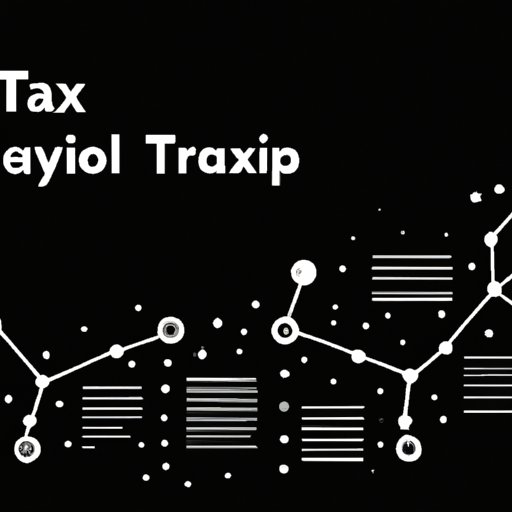Introduction
Cryptocurrency has become increasingly popular in recent years, with investors around the world buying and trading digital coins. With this growth comes the need to understand the taxation rules surrounding cryptocurrency transactions. Filing crypto taxes can be a complex and confusing process, but it’s important to understand the regulations in order to properly report your gains and losses.
In this article, we’ll explore the various aspects of filing crypto taxes. We’ll look at the definition of cryptocurrency, provide an overview of crypto tax strategies, and offer a step-by-step guide for filing your taxes. We’ll also discuss the different tax rules for U.S. and non-U.S. taxpayers, as well as best practices for accurately reporting crypto gains and losses.
Definition of Cryptocurrency
Cryptocurrency is a form of digital currency that uses cryptography to secure transactions. Unlike traditional currencies, which are issued by governments and backed by central banks, cryptocurrencies are decentralized and not regulated by any single entity. Bitcoin is the most widely known and traded cryptocurrency, but there are many others, such as Ethereum, Litecoin, and Ripple.

Overview of Crypto Tax Strategies
The taxation of cryptocurrency transactions is complex and varies from country to country. Generally speaking, however, most countries tax crypto trades as capital gains or losses. This means that when you sell cryptocurrency, you must pay taxes on any profits you make (capital gains). Similarly, if you incur a loss when selling crypto, you may be able to deduct the loss from your taxable income (capital losses).
It’s important to note that the taxation of cryptocurrency transactions is still evolving, so you should consult with a tax professional to ensure that you’re following the most up-to-date regulations. Additionally, some countries have specific rules for taxing cryptocurrency transactions, so it’s important to familiarize yourself with the laws in your jurisdiction.
Step-By-Step Guide to Filing Crypto Taxes
Filing crypto taxes can be a daunting task, but it doesn’t have to be. Here’s a step-by-step guide to help you navigate the process.
Gathering Necessary Information
The first step in filing your crypto taxes is to gather all the necessary information. You’ll need to know the date, price, and amount of each crypto transaction you’ve made over the course of the year. Additionally, you’ll need to know the cost basis of each transaction, which is the total amount you paid for the cryptocurrency, including any fees or commissions.
Submitting the Required Forms
Once you’ve gathered all the necessary information, you’ll need to submit the appropriate forms to the IRS. For U.S. taxpayers, this usually means filing Form 8949, which is used to report capital gains and losses from the sale or exchange of property. Non-U.S. taxpayers may need to file additional forms, depending on their jurisdiction.
Calculating Gains and Losses
Once you’ve submitted the required forms, you’ll need to calculate your gains and losses from each cryptocurrency transaction. To do this, you’ll subtract the cost basis (the total amount you paid for the cryptocurrency) from the proceeds (the amount you received from selling the cryptocurrency). The difference between these two figures is your gain or loss for the transaction.
Keeping Track of Your Records
It’s important to keep track of your records throughout the year, as this will make filing your crypto taxes much easier. Make sure to save all receipts and invoices related to your cryptocurrency transactions, as well as any other documents that could be relevant to your taxes.

Exploring the Tax Implications of Cryptocurrency Transactions
When it comes to filing crypto taxes, it’s important to understand the different types of taxes that may apply to your transactions. Generally speaking, cryptocurrency transactions are subject to either short-term or long-term capital gains taxes.
Short-Term vs. Long-Term Capital Gains
Short-term capital gains taxes apply to cryptocurrency transactions that occur within one year of the purchase date. These gains are taxed at your ordinary income tax rate. Long-term capital gains taxes, on the other hand, apply to transactions that occur more than one year after the purchase date. These gains are typically taxed at a lower rate than short-term gains.
Determining Taxable Events
Not all cryptocurrency transactions are subject to taxation. In order for a transaction to be considered a taxable event, it must meet certain criteria. For example, in the U.S., any transaction that results in a gain of more than $600 is considered a taxable event. Additionally, receiving cryptocurrency as a gift or inheritance is also considered a taxable event.
Understanding the Different Tax Rules for Cryptocurrency Investors
Different countries have different rules for taxing cryptocurrency transactions. It’s important to familiarize yourself with the regulations in your jurisdiction.
U.S. Taxpayers
In the U.S., cryptocurrency transactions are generally subject to capital gains taxes. Additionally, U.S. taxpayers must also report any transactions that involve virtual currency on their annual tax return. Failure to do so could result in penalties or even criminal charges.
Non-U.S. Taxpayers
Countries outside the U.S. may have different rules for taxing cryptocurrency transactions. For example, some countries may treat cryptocurrency as a commodity, while others may treat it as a form of currency. As such, it’s important to research the regulations in your jurisdiction before filing your crypto taxes.

Navigating the Complexities of Crypto Tax Regulations
Crypto tax regulations can be complex and vary from country to country. Here are some tips for navigating the complexities of crypto tax laws.
International Tax Laws
If you’re a foreign investor, it’s important to understand the tax laws in your home country. Some countries may require you to report cryptocurrency transactions, while others may not. Additionally, some countries may have specific rules for taxing cryptocurrency, so it’s important to research the regulations in your jurisdiction.
State Regulations
It’s also important to familiarize yourself with state regulations. Some states may have specific rules for taxing cryptocurrency transactions, so it’s important to research the regulations in your state before filing your taxes.
Best Practices for Accurately Reporting Crypto Gains and Losses
Accurately reporting your crypto gains and losses is essential for avoiding penalties and fines. Here are some best practices to keep in mind.
Establishing an Internal System
Having an internal system for tracking your crypto transactions can help you stay organized and ensure that you’re accurately reporting your gains and losses. Consider using a spreadsheet or accounting software to keep track of your transactions and calculate your cost basis.
Working with a Professional Tax Preparer
Tax law can be complex, so it’s always a good idea to work with a professional tax preparer. A qualified tax preparer can help you understand the regulations in your jurisdiction and ensure that you’re filing your taxes correctly.
Conclusion
Filing crypto taxes can be a complex and confusing process, but it’s important to understand the regulations in order to properly report your gains and losses. This article provided an overview of the process, from gathering information to accurately reporting gains and losses. We also discussed the different tax rules for U.S. and non-U.S. taxpayers, as well as best practices for accurately reporting crypto gains and losses. By understanding the taxation rules and following best practices, you can ensure that you’re filing your crypto taxes correctly.
(Note: Is this article not meeting your expectations? Do you have knowledge or insights to share? Unlock new opportunities and expand your reach by joining our authors team. Click Registration to join us and share your expertise with our readers.)
